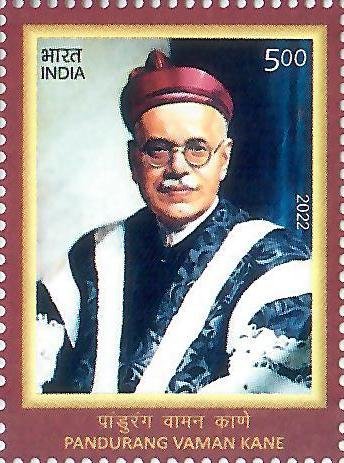Dr. Pandurang Vaman Kane (1880-1972) Commemoration

Technical Data
| Date of Issue | April 18, 2022 |
|---|---|
| Denomination | Rs. 5 |
| Quantity | 302,200 |
| Perforation | comb 14 |
| Printer | Security Printing Press, Hyderabad |
| Watermark | No Watermark |
| Colors | Multicolor |
| Catalog Codes |
Yvert et Tellier IN 3462 Stanley Gibbons IN 3814 |
| Themes | Commemoration | Famous people | Historians | Men |
It is not often that one comes across stories of people who have had a strong vision and mission guiding their entire life. Dr. Pandurang Vaman Kane is one such person who never let his interest in research fade the slightest. Born in a village called Pedhem near Chiplun in the Ratnagiri district of Maharashtra on May7, 1880, Dr.P.V.Kane is a source of unending inspiration to generations of young Sanskritists and Indologists.
Dr. Kane was a precocious child who had committed to memory, 400 verses of Amarakosa, by the age of 12. He passed his Matriculation examination of Bombay University in 1897. He passed his B.A. with Sanskrit and was awarded Bhau Daji prize for proficiency in Sanskrit. In 1902, he passed first L.L.B. examination in First Class and got his M.A. in 1903, with Sanskrit and English, securing the Zala Vedanta prize of Rs. 400/- for the paper setting and answered in Sanskrit.
Prof. Kane’s career at the Bar proved to be a great success. He came to be recognized as an authority at Hindu Law, respected by the Bench and Bar. He worked in the legal field from 1919 to 1949. At the same time, he pursued his Indology studies. His introduction to Sahityadarpana of Vishvanatha published in 1910, so highly impressed the French Scholar Sylvan Levi that he urged Kane to write a full-fledged history of Sahityashastra.
In 1923, Kane published a 2nd edition of Sahityadarpana with an introduction of 77 pages dealing with the history of Alankarashastra. In 1951 edition, this history was enlarged to 423 pages and then published as a separate volume, in 1961. Dr. Kane’s researches in Dharma-Shastra started in 1911 by undertaking an edition of a book called Vyavahara Mayukha. Kane’s critical edition of the work was published in 1928.
Asiatic Society of Bombay had been his second home. He took part in the activities of the Society as member of its Managing Committee as well as its Vice President for several years. He was also editor of its journal. He was one of the Funders of the Bhandarkar Oriental Research Institute. He was closely associated with the Deccan College as well as Maharashtra Sahitya Parishad.
History of Indian culture and religion will remain incomplete without a reverential reference to his monumental work. His contributions are marked by an extensive sweep of his research interest and activity in the domains of Mimamsa, Dharmashastra, Indian astronomy and astrology, Sanskrit poetics, and the Indian jurisprudence.
Department of posts is pleased to issue a Commemorative Postage Stamp on Pandurang Vaman Kane.
